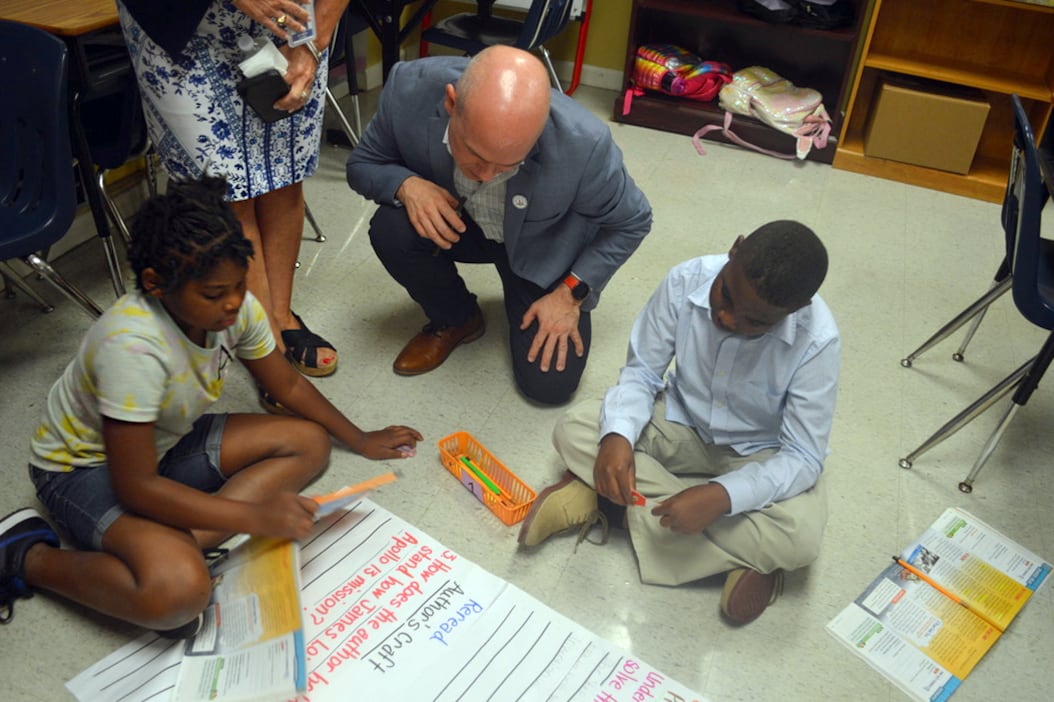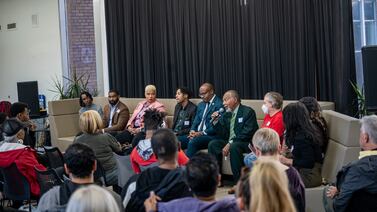Sign up for Chalkbeat Tennessee’s free daily newsletter to keep up with the Memphis-Shelby County Schools and statewide education policy.
Memphis-Shelby County Schools students gained some ground on state math tests, newly released test scores show, but they have yet to rebound to pre-pandemic proficiency levels.
In English language arts, where the district recouped pandemic era losses last year, scores stagnated.
Officials released the district-level results of the Tennessee Comprehensive Assessment Program, known as TCAP, Tuesday afternoon.
The gains for Memphis were much more modest than the previous year, when officials trumpeted a district “trending up” following devastating academic declines during the pandemic. Overall, scores on the tests students took in the spring approached 2019 levels but have yet to completely return for all students and subject areas.
MSCS Deputy Superintendent Angela Whitelaw acknowledged in a statement that the district had “continued work to do this year.”
Statewide, math scores followed a similar trajectory as in Memphis, although scores for MSCS students were lower than statewide averages. In MSCS, 15% of students were on track for their grade in math compared with 23% in 2019. The 2021 low was 7%.
But while Tennessee students in general continued to see literacy gains, Memphis did not see much growth after last year’s rebound.
Students in grades 3-8 take the state assessments each year, and high school students take subject-area tests at the end of their courses.
“One key takeaway for me is the momentum we saw in our high schools,” Whitelaw said. “With the exception of English 1, we saw gains across the board.”
The score reports do not reflect the progress of students as they move from one grade to the next. For now, they can be used only to compare, say, this year’s sixth graders to last year’s sixth graders.
So they don’t capture how much this year’s third graders in Memphis improved from when they were in second grade. Those improvements showed up in an analysis MSCS shared earlier this summer in connection with Tennessee’s new reading law. This past year’s third graders were the first class subject to the new state law, which uses students’ TCAP scores in English language arts to determine whether they need more intervention to avoid being held back.
MSCS’ recovery efforts have helped students who are the farthest behind, the data shows. In both ELA and math, the share of students who scored “below” proficiency on the test — the lowest performance level — continued to shrink. But for both subjects, that share is still larger than in 2019, and the divide is more pronounced in math.
“Having visited these classrooms this morning, it helps me to remain hopeful and optimistic,” Bill White, a top MSCS academic leader, said after a tour of summer class at Shelby Oaks Elementary. “Because the data nationwide shows me that coming out of those learning losses is going to be tough, and it’s going to be slow, and it’s going to require extra time and instruction.”
The testing data reflects achievements from the most normal school year the district’s students have had since classrooms shuttered in March 2020 as a precaution against the spread of COVID-19. The 2021-21 school year was online for most Memphis students. They returned to classrooms in 2021-22, but spikes in COVID-19 infections led to waves of absences and disruptions to learning.
Students didn’t have those kinds of disruptions this past school year, but the district did have a turbulent year, starting off with transitions in top leadership and ending with the fallout of a stalled superintendent search.
For the coming school year, the board plans to order a review of the district’s academic programs, which interim Superintendent Toni Williams has started preparing. The results are expected to also inform spending decisions as federal COVID relief funds run out.
“We know the district is doing something right,” board member Kevin Woods said about the academic review. “And I think the better way we frame that is why so many of our students struggle, with all the investments that we make.”
Laura Testino covers Memphis-Shelby County Schools for Chalkbeat Tennessee. Reach Laura at LTestino@chalkbeat.org.
Bureau Chief Tonyaa Weathersbee oversees Chalkbeat Tennessee’s education coverage. Reach her at tweathersbee@chalkbeat.org.
Thomas Wilburn is the senior data editor for Chalkbeat. Reach Thomas at twilburn@chalkbeat.org.





